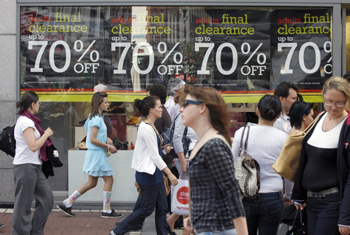Incomes stabilising – IBEC

Consumer incomes will stabilise in 2012 after two years of significant declines, according to IBEC which recently published its first Irish Consumer Monitor.
6 July 2012
The report follows IBEC’s launch of its ‘Driving Ireland’s Recovery’ campaign earlier this year which highlights the need to take decisive steps to restore domestic demand and boost spending in the economy as a key part of the wider campaign.
According to IBEC, “Tough household budget fundamentals coupled with a further decline in consumer confidence resulted in a drop in consumer spending of almost two per cent”.
However IBEC’s Chief Economist Fergal O’Brien believes that a significant number will see their spending power increase this year “due to falling interest rates, modest pay rises and the absence of significant additional taxation”.
He continued, "The main cause of the unemployment crisis is the lack of consumer confidence and weak domestic demand. Getting people back to work is the priority, but to do this we need a return to more normal, sustainable consumer spending levels. There are some positive signs domestically, but eurozone worries continue to unnerve consumers".
Key trends highlighted in the Irish Consumer Monitor include:
- Mortgaged working households will see spending power increase by 2.4 per cent due to falling interest rates
- Other groups, however, will see spending power decline by between 0.8 per cent and 3.7 per cent
- Despite a return to net emigration in 2009, high birth rates mean that the population continues to grow
- Significant immigration is likely to return when economic conditions improve
- Despite positive domestic signs, eurozone worries remain
The net savings ratio has jumped sharply to about 10 per cent as a result of the recession. A savings ratio in the region of five per cent would be more normal for an economy such as Ireland but a sustained rebound in consumer confidence is necessary for this to materialise.
However the report also warns, “There is of course no guarantee that this increased discretionary income will result in higher consumer spending and it could well be used for savings or accelerated debt repayment”.
This view is supported by the ESRI/Nationwide (UK) Ireland savings index. Data for the first three months of 2012 show that when asked about intentions for any surplus money, about half of the respondents said they would use any extra cash for debt repayment and one-third would save the money.
Separate data from the Central Bank on households’ financial transactions confirms that a large portion of saving is taking place as debt repayment.
According to the report, the 2009/2010 Household Budget Survey highlights the impact the recession has had on Irish consumers.
“Consumption patterns have moved away from non-essentials such as eating out, recreation and alcohol and consumers are instead spending a greater proportion of income on housing, energy and health.”
It explained, “Spend on alcoholic drink fell by 25 per cent; this is linked to a change in consumption mode as the share of home consumption increased to 41 per cent from 32 per cent in 2004/2005”.
The spend on alcohol in 2009/2010 fell to €26 from €35 in 2004/2005 with alcohol’s share of total household expenditure falling from 4.4 per cent to 3.3 per cent in that time.
A new survey from the CSO specifically on households’ response to the crisis shows that 79 per cent have made cutbacks in at least one area of expenditure and on average households have made nearly three cutbacks. Reflecting the trend in the Household Budget Survey, discretionary spending on items such as clothing and footwear, going out, groceries and holidays abroad was most often reduced. In the case of going out, the CSO indicates that nearly 60 per cent of households have included this among their cutbacks.
IBEC has set out a range of proposals to kick-start the domestic economy, including:
- Reform of pension rules to allow people to unlock and use part of their AVC and personal pension savings now
- Tax incentives to encourage additional home renovation activity and move work from the informal to the formal economy
- A new social welfare smart card system, to ensure child benefit payments are spent in the domestic economy.
The report concludes, “A comprehensive communications strategy is essential to restoring and rebuilding consumer confidence. While the economy was in freefall this was not possible. The time it took to get to grips with the scale of the crisis led to many false starts but now that GDP and exports have returned to growth, it is essential for Government to counter the damaging and misleading claims about the economy and target communications specifically at consumers’ concerns”.



 Print
Print






Fans 0
Followers